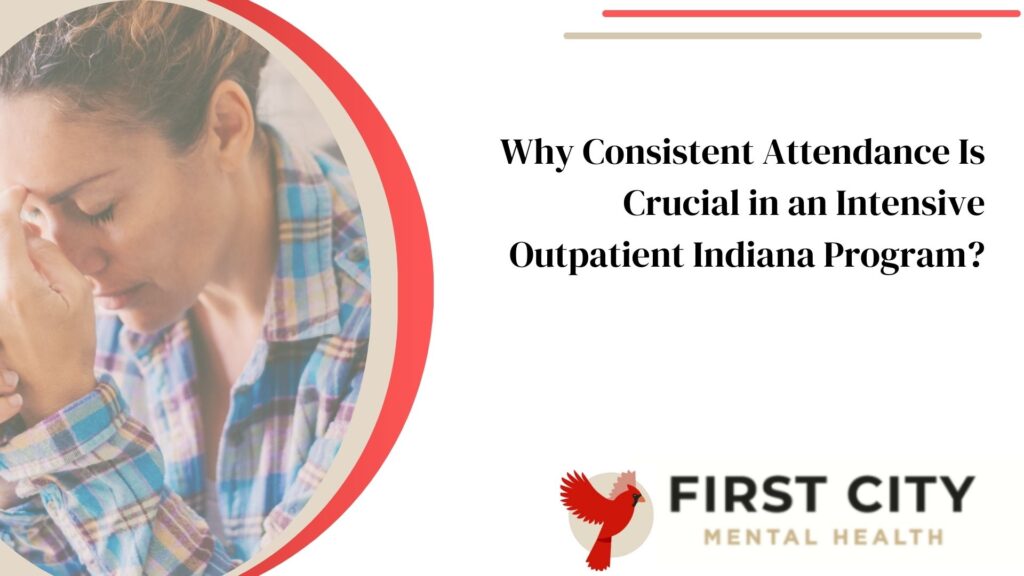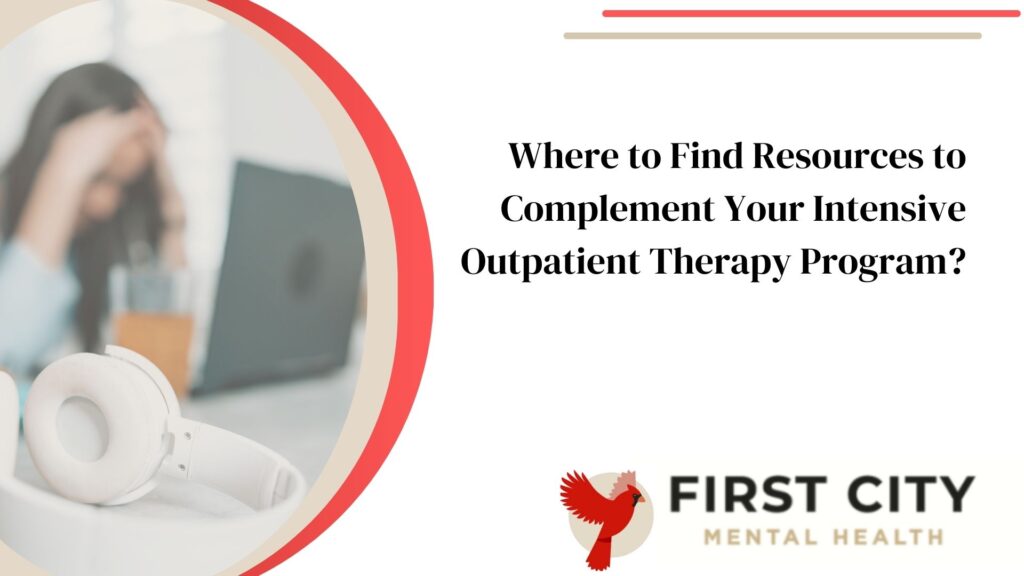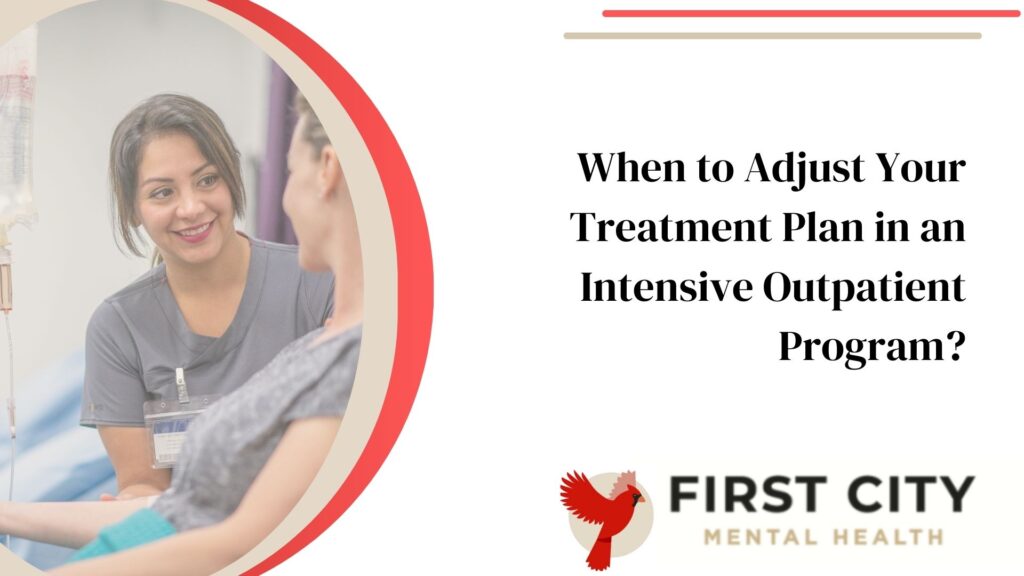
Why Choose a Partial Hospitalization Program for Bipolar Disorder?
August 22, 2025
How to Decide if Intensive Outpatient Indiana Treatment Is Right for You?
August 27, 2025Many people in Indiana struggle to find the right balance between work, family, and managing mental health issues. If you’re feeling overwhelmed or unable to cope with stress, an Intensive Outpatient Program (IOP) might be just what you need.
Specially created for those who require more support than traditional therapy but don’t need inpatient care, these programs offer a structured environment to help you regain control over various behavioral health conditions.
An Intensive Outpatient Indiana program typically lasts 4-6 weeks and includes various therapies customized to individual needs. Whether you’re dealing with depression, anxiety, or other mental health conditions, this type of program can provide valuable coping strategies and skills.
This blog will guide you on how to maximize the benefits of such a program. We’ll cover preparation steps, the importance of consistent attendance, seeking extra support when needed, and setting realistic goals for your journey in mental health treatment, among other topics.
Stay tuned!
Key Takeaways
- Prepare well by consulting your doctor, arranging reliable transportation, scheduling time off, organizing childcare, and checking financial coverage beforehand. This ensures you can focus fully on the therapy.
- Consistent attendance is crucial for effective recovery. Regular sessions help build essential life skills and maintain medication management.
- Setting realistic goals aids in tracking progress effectively. Break down larger objectives into smaller milestones and regularly assess with your treatment team for accountability.
What Steps Should You Take to Prepare for an Intensive Outpatient Kokomo Program?
Preparation for intensive outpatient Kokomo programs, such as the Intensive Outpatient Kokomo Program, is essential. Follow these steps to get ready:
- Consult Your Doctor
Discuss your medical history, symptoms, and treatment goals with your doctor. They will help you understand if the intensive outpatient program is suitable.
- Arrange Transportation
Ensure you have a reliable way to get to the sessions, which occur 3-4 times a week and last about three hours.
- Schedule Time Off
Inform your employer or school about your schedule to manage daily responsibilities effectively.
- Organize Childcare
If you have children, plan for childcare during your sessions to maintain focus on your therapy.
- Prepare Financially
Check with your insurance provider about coverage for the intensive outpatient therapy program. Verify costs and prepare any required payments.
- Gather Medical Records
Collect relevant documents like previous medical history and current medications to share with the multidisciplinary team of psychologists, psychiatrists, social workers, and counselors.
- Set Personal Goals
Establish clear, realistic goals for recovery and improving mental health concerns such as posttraumatic stress disorder (PTSD).
- Create a Support System
Inform family members or friends about your treatment plan so they can provide emotional support throughout the process.
- Identify Emergency Contacts
List contacts who can be reached in case of emergencies during your treatments.
- Plan for Aftercare
Consider what steps you will take after completing the program to maintain progress and avoid relapse.
Why Consistent Attendance Is Crucial in an Intensive Outpatient Indiana Program?

Consistent attendance ensures patients participate in necessary therapeutic support for recovery. Regular participation enhances the effectiveness of therapy sessions. Attending all sessions aids in developing essential life skills and independent living capabilities.
Consistency fosters stronger relationships with professionals and peers for support.
Frequent engagement helps maintain medication management and treatment adherence for intensive outpatient program mental health. Missing sessions can disrupt the continuity of care, potentially hindering progress and recovery outcomes.
When Should You Seek Additional Support During the Adult Intensive Outpatient Program?
Seek additional support if you feel overwhelmed or struggle to cope with daily challenges during the adult Intensive Outpatient Program (IOP). If you experience a mental health crisis, it is crucial to seek additional support immediately. Reach out for extra help if you experience a resurgence of symptoms or emotional distress.
Engaging in more frequent therapy sessions can enhance your progress. Medication management services can assist with any necessary adjustments to your medications.
Participate in support groups or community resources for added emotional support. “Regular communication with your treatment team about concerns is crucial,” advises Dr. Smith, a licensed therapist in Indiana.
Utilize these resources to ensure comprehensive care throughout your mental health journey.
Where to Find Resources to Complement Your Intensive Outpatient Therapy Program?

Finding resources to complement your Intensive Outpatient Program Mental Health can enhance your recovery journey. Utilize online resources such as mental health services websites for educational materials and webinars.
Libraries often provide books on coping strategies and mental illness. Support groups in Fort Wayne offer face-to-face interactions where you can share experiences.
Look into virtual IOP options that fit into daily lives, offering flexibility with online sessions. Engage in recreational therapy programs to ease negative emotions like anxiety or posttraumatic stress disorder symptoms.
Group facilitators help during group therapy sessions, providing more insights and support services customized to specific needs. Local community centers also host therapeutic activities useful for life skills reintegration across four to six weeks of treatment.
How to Set Realistic Goals for Your Intensive Outpatient Journey for Mental Health?
Set Clear, Specific Goals:
Write precise goals based on your needs in the intensive outpatient program mental health journey. This creates a clear path. For instance, if you are dealing with generalized anxiety disorder, set specific goals to manage your anxiety levels.
Focus on Achievable Milestones:
Break down bigger goals into smaller, weekly targets within the 4-6 week program. This keeps progress manageable and trackable.
Engage in Therapy Sessions:
Actively participate in both individual therapy and group sessions. Engage fully for best results.
Incorporate Psychoeducation and Skill-Building:
Include learning new skills as part of your goal-setting process. These help improve coping mechanisms.
Regularly Assess Progress:
Meet with your treatment team often to discuss advancements and setbacks. Stay accountable throughout the journey.
Emphasize Life Skills Reintegration:
Focus on goals that help transition back into daily life smoothly post-program. This aims at better independent living.
Utilize Medication Management:
Make medication management a key part of your plan if prescribed by your healthcare provider.
Adjust Goals When Necessary:
Be flexible with goals as you progress through the program to adapt to new challenges or changes.
Seek Support from Others:
Rely on family or friends for encouragement to keep moving forward effectively during tough times.
Track Your Successes and Challenges:
Write down what worked well and areas needing improvement for future reference in maintaining mental health wellness.
What Role Does Family Support Play in Your Intensive Outpatient Success?
Engaged family members enhance treatment outcomes. They provide emotional support, which reinforces the skills learned in an intensive outpatient treatment program. Family involvement helps identify triggers and stressors that affect mental health.
Open communication creates a supportive environment conducive to recovery. Participation in family therapy sessions strengthens family dynamics and facilitates healing. Educating family members about the patient’s condition improves their ability to support recovery efforts effectively.
Why Building a Support Network Is Vital During Intensive Outpatient Treatment?
Building a support network enhances accountability and motivation during treatment. A strong support network provides emotional and psychological support from peers and loved ones.
Participation in group therapy sessions fosters connections among individuals in the Intensive Outpatient Program (IOP).
Engaging with family and friends can improve treatment outcomes and reduce feelings of isolation. Support networks assist in facing challenges associated with life skills reintegration post-treatment.
Having a reliable system reduces the risk of relapse, contributing to sustained recovery over time.
When to Adjust Your Treatment Plan in an Intensive Outpatient Program?

Support from family, friends, and other patients is crucial during the Intensive Outpatient Program (IOP). Sometimes you need to adjust your treatment plan. If withdrawal symptoms persist or new ones appear, inform your counselor.
This may indicate a change in medication needed for effective care. Persistent issues like posttraumatic stress disorder require attention too.
If attendance drops below the required level or if progress stalls, rethink your approach. Programs typically last 30 to 35+ days but may need adjustments based on individual needs.
Medication management is an integral component of this plan and should be reviewed regularly by highly trained professionals to ensure clinically excellent care.
Conclusion
Attending an Intensive Outpatient Program Indiana (IOP) can change lives. Keep going to all sessions, as this helps you stay on track. Set small goals that you can reach step by step. Stay in touch with your family and build a support group around you.
Look for extra help if needed and use local resources to expand your care plan for steady progress.
FAQs
What is an Intensive Outpatient Program (IOP) in Indiana?
An Intensive Outpatient Program (IOP) in Indiana provides a higher level of care for individuals with addiction, co-occurring substance use, and behavioral issues.
How can patients maximize benefits from outpatient services?
Patients should participate actively in counseling sessions, follow their personalized care plan, and engage in face-to-face interactions to receive the best care.
What types of conditions do these programs address?
These programs address post-traumatic stress disorder, substance use disorders, and other mental health conditions requiring intensive treatment.
Is aftercare planning important?
Yes! Aftercare planning ensures continued support and helps maintain progress made during the program.
Can adolescents also benefit from IOPs?
Yes! Both adults and adolescents can benefit from these programs tailored to provide personalized care plans that ensure privacy while addressing specific needs.






